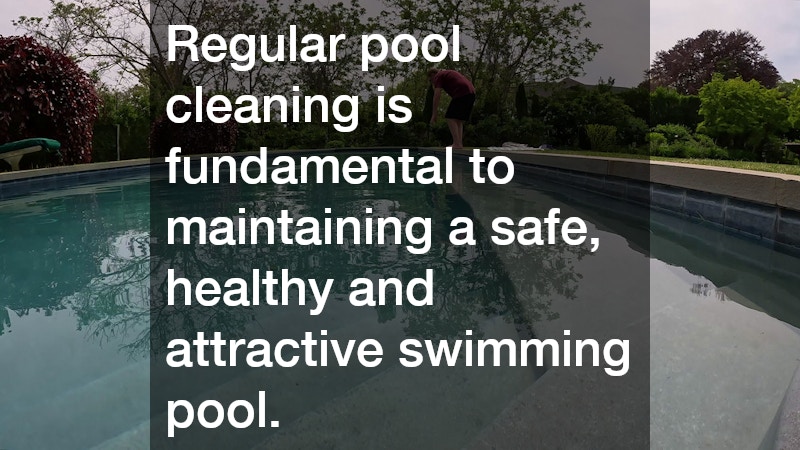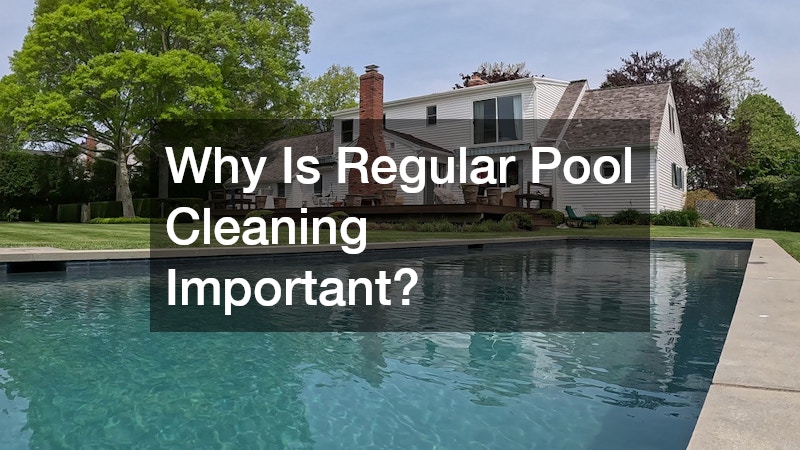Maintaining a swimming pool is more than just a luxury—it’s a vital part of ensuring a safe, enjoyable and long-lasting aquatic environment. Regular pool cleaning is essential for every pool owner, whether it’s a private backyard oasis or a community recreational facility. This article explores why keeping your pool clean is important, the benefits it brings and the best practices to maintain water quality and safety.
1. Ensuring Health & Safety
One of the most important reasons for regular pool cleaning is health and safety. Pools that are not cleaned regularly can quickly become breeding grounds for harmful bacteria, algae and other pathogens. These microorganisms can cause a range of health issues, from minor skin irritations and rashes to serious infections such as ear and respiratory illnesses.
When pool cleaning is neglected organic matter such as leaves, dirt and body oils accumulate, creating an environment conducive to bacterial growth. Regular cleaning removes these contaminants and helps maintain balanced water chemistry, reducing the risk of waterborne illnesses.
2. Enhancing Water Quality
Clear, sparkling water is the hallmark of a well-maintained pool. Without regular cleaning, pools can become cloudy and uninviting, often due to imbalanced chemical levels and suspended particles. Pool cleaning involves skimming debris, vacuuming the pool floor and brushing the walls to eliminate algae buildup.
Proper circulation and filtration are crucial for maintaining water clarity. Cleaning tasks such as checking and cleaning filters, backwashing and balancing chemical levels ensure that the water remains crystal clear and pleasant for swimmers. Clean water also minimises the use of harsh chemicals, which can irritate the skin and eyes.
3. Protecting Pool Equipment & Structure
Regular pool cleaning extends beyond just the water—it plays a key role in preserving the pool’s structural integrity and its equipment. Dirt, debris and algae can cause damage to pumps, filters and heaters if left unchecked. Clogged filters and dirty pumps can lead to costly repairs or premature replacement.
Additionally, algae growth on pool surfaces can cause staining and corrosion, weakening tiles, plaster and liners over time. Regular brushing and vacuuming prevent this buildup and protect the pool’s finish, maintaining its aesthetic appeal and value.
4. Cost Savings Over Time
Many pool owners underestimate the financial benefits of regular pool cleaning. While professional cleaning services or buying cleaning equipment might seem like an added expense, it actually saves money in the long run. Neglected pools often require expensive treatments to remove heavy algae, fix equipment damage or replace pool surfaces.
By committing to regular pool cleaning, owners reduce the risk of costly repairs and chemical overdoses. Maintaining the pool correctly keeps everything functioning efficiently, ensuring energy savings on pumps and heaters and extending the lifespan of the pool’s components.
5. Improving Swimming Experience
A clean pool simply provides a more enjoyable swimming experience. Nobody wants to swim in murky water filled with leaves and debris, nor do they want to deal with unpleasant smells or slippery pool surfaces caused by algae. Regular cleaning ensures the pool is always inviting, safe and pleasant to use.
This is especially important for families with children, as young swimmers are more susceptible to infections from poorly maintained pools. Clean pools also encourage more frequent use, helping families and communities maximise the value and enjoyment of their aquatic spaces.
6. Compliance with Local Regulations
In many parts of Australia, pools are subject to local government regulations requiring regular maintenance to ensure safety and hygiene. These rules often include regular inspections, water quality testing and mandatory cleaning schedules.
Adhering to these regulations through consistent pool cleaning protects pool owners from legal issues and fines. It also ensures that pools meet public health standards, particularly for commercial or public pools where safety is paramount.
7. Best Practices for Regular Pool Cleaning
Regular pool cleaning involves several key tasks that pool owners or professional cleaners should follow consistently. Using a skimmer net daily to remove leaves, insects and floating debris helps prevent buildup on the water’s surface. Weekly brushing of pool walls, floors and steps is essential to prevent algae and dirt accumulation. Vacuuming the pool floor on a weekly basis removes settled dirt and particles that can cloud the water or damage surfaces.
Maintenance of the pool’s filtration system is also crucial; this includes cleaning or backwashing filters regularly to maintain proper water flow and filtration efficiency. Another important aspect is testing the water chemistry at least twice a week to monitor and adjust pH, chlorine and alkalinity levels as needed. Periodic “shock” treatments with a higher dose of chlorine help eliminate bacteria and contaminants that routine cleaning may miss.
The Lasting Benefits of Regular Pool Cleaning
Regular pool cleaning is fundamental to maintaining a safe, healthy and attractive swimming pool. Beyond improving water quality and swimmer safety, it protects your investment by preventing damage to pool equipment and surfaces. It also saves money by avoiding costly repairs and prolonging the life of your pool.
In Australia, where pool ownership is common, regular cleaning is not just a recommendation—it is a necessity. Whether you choose to clean your pool yourself or hire a professional service, consistent pool cleaning will ensure that your pool remains a refreshing and enjoyable place for years to come.
Investing time and effort in regular pool cleaning ultimately pays off in peace of mind, safety and the pure joy of swimming in a pristine pool environment.
.

